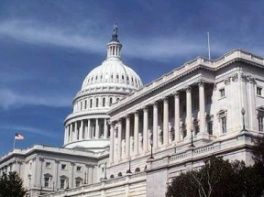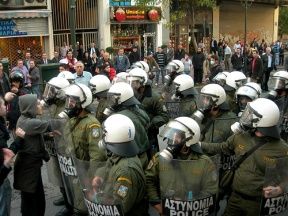| « Running Back to India - To Feed the Hungry | STOCK MARKET COLLAPSE: MORE GOLDMAN MARKET RIGGING? » |
Whom Does the State Represent?
By Numerian

“Where are Margaret Thatcher and Ronald Reagan when you need them?” So lamented CNBC business commentator Larry Kudlow yesterday in response to riots in Greece over proposed financial cutbacks. Greek protesters, numbering over 10,000, shut down commerce, took over the Acropolis – Athens’ ancient birthplace of democracy - and firebombed office buildings and police stations. Three employees died of smoke inhalation in a fire at a bank – the first deaths in a Greek protest since 1991.
Kudlow asserted that these riots were the work of the unions, and what Greece needed was a tough guy in the mold of Thatcher or Reagan who would stand up to the unions. Public sector unions are certainly at the forefront in organizing these protests, but Greek authorities say that the violence is being perpetrated by “anarchists” – youth in their 20s who show up at a protest scene dressed all in black, with black hoods or masks, and who then begin to throw stones at the police and Molotov cocktails at bank buildings.
No one seems to know who these anarchists represent or how they are organized, but their presence on the scene and the ensuing violence is said by reporters to have horrified the average Greek citizen. Greece is used to large-scale public protests, especially by the unions, and sometimes the government itself is forced out as the result of protests. But violence of this sort is rare and disturbing. Some observers in Athens think this violence could continue all summer, given the profound anger many Greeks have at the financial cutbacks that are now being imposed on them by their own government and by other EU governments, especially Germany. Others believe the public will turn sharply rightward in the face of such violence and demand or at least tolerate more authoritarian measures by the Papandreou government.
Which way Greece turns is a matter of importance for anyone who supports liberal democracy, and whether the Greek situation spreads to Spain or Portugal or elsewhere in Europe is equally of moment. Greece has been a functioning democracy in the liberal European manner since World War II. It fits in the mold of a Southern European country like Italy or Spain, where the unions have managed to coerce the state into granting their members job benefits that appall the thrifty Germans, and where government appeases these demands by taking on ever more debt and kicking the can down the road. The can now has nowhere to go and the Greeks are being forced by the outside world – otherwise called “the markets” – to do something about their enormous debts and their outsized promises to public sector workers.
Kudlow has a point about union largesse and the burden it now imposes on Greek society, however wrong he may be about these protests. But it is important to remember that Greece is not like other Balkan countries such as Kosovo or Serbia, where centuries of ethnic and religious conflict break out periodically in war and genocide. Greece is far different – an integral part of the European post-war experiment in solving problems through a unified rather than a fractured Europe. This experiment has traveled far enough to have created a European president, parliament, and single currency, of which Greece is a member. This experiment threatens to unravel to some significant degree depending on what happens in Greece and whether the risk of “contagion” to other European countries becomes reality.
It is not only Europe that should worry about the outcome. Liberal democracies around the world have bought social peace and prosperity through piling on debt upon debt at all levels of society – government, business, and the consumer are all grappling with a mountain of debt that has reached the tipping point. The debt is demanding to be repaid, rolled over with new debt, or defaulted upon; the first two choices are becoming impossible for countries like Greece, and the last choice is anathema to ruling elites.
What the Greek protesters are asking in a basic way is why their government does not choose option number three. For many Greeks, their role in the buildup of government debt was at best passive, but what the Greeks have discovered is that they were deliberately misled by their government and the international banks about the true size of the debt burden they have now inherited. Fraud took place, debts were incurred secretly through derivatives, and both the Greek public and the EU Commission, which approved Greece’s entry into the euro based on fraudulent debt records, were none the wiser. The anger that is taking place in Germany at this deception is no different from the anger felt on the streets of Athens.
The German government this week, oddly enough, sided with the protesters on selecting option number three. Chancellor Angela Merkel’s government proposed that any future Greek situations in Europe be resolved through an orderly sovereign bankruptcy with rules agreed to in advance. This means the country involved will be allowed to default on its debt, dragging the banks and investors around the world into the circle of pain that so far has only been imposed on the general public.
This is radical talk and represents the first crack in what has been to date a solid front by democracies around the world in support of the international banking system and the monied interests against the interests of the public. Where such talk will lead is anybody’s guess, but the road being taken will answer the vital question “whom does the state represent?” Is it the banks, the hedge funds, the private equity moguls, the bond market traders, the rating agencies? Or is it the office worker, the retired person, the teacher, the fireman, the homemaker?
In a country like the US, so far the state clearly speaks for money. The federal government has had difficulty finding $18 billion to continue funding extended unemployment benefits for those out of work, but it had absolutely no difficulty finding $700 billion when it came time to bail out the banks. The Federal Reserve took upon itself the right to buy over $1 trillion in fraud-riddled mortgage securities from the banks, and now it is looking for a way to pass these assets secretly on to the federal government – possibly to Fannie Mae and Freddie Mac – so that hundreds of billions of dollars of losses can be borne by the taxpayer rather than the banks, which are enjoying record earnings and bonuses. The Fed refuses to reveal the price it paid for these assets, and along with the White House it is vigorously working to kill a provision in the House and Senate financial reform package that would require an outside audit of the Fed.
Like the Greeks, Americans do not know what their government has been up to, and what the true debt situation is. American suspicion of their own government is at an all-time high, and it comes from the right as well as the left. Tea Partiers and liberal Democrats are united at least in the fear that their government is working against the interests of the average person. There is also a growing recognition that the American debt situation is as severe as that of Greece, and that draconian cutbacks in social welfare and personal living standards could easily be imposed in the United States.
Should protests erupt in the US, and should they become violent, which is not out of the question considering how heavily armed the populace is, the government is not without resources if it decides to maintain solidarity with the elite and powerful. Since 9/11 the surveillance state has grown enormously. The NSA is, by some public accounts, listening in routinely on almost all voice and internet traffic of hundreds of millions of Americans. Surveillance cameras are now everywhere. SWAT teams have sprung up not only in a multitude of federal and state and local government agencies, but among private mercenary companies like Blackwater. Torture through the use of devices like the Taser is not only publicly acceptable, but the public has been encouraged to cheer on the authorities no matter how egregious their use is of these weapons. The military is being trained to intervene on American soil in the event of domestic violence. Civil liberties such as the right of habeas corpus or the right to an attorney have been legally restricted through the Patriot Act. The press has been turned over to the pockets of powerful media conglomerates, and corporations have been granted personhood and the right to intervene in elections.

The state has become more powerful than ever, and not only in the US. “Whom does the state represent?” is the most vital question of our times. Other than the possible exception of Germany, which is beginning to hold money accountable for its actions, the state does not work for the people, and has shown no inclination to force banks and other powerful financial interests to suffer alongside of the people when it comes to liquidating the debt mountain. This is why the Greek protests matter. Along with Icelanders, the Greek population is rising in protest against the banks and the powerful who are willing to impose economic pain on everyone but themselves. The Greek protests, however, have turned violent. If this sort of violence spreads, as it easily could, governments are in a strong position to turn repressive and reactionary, using public concern over the violence as their excuse to institute a police state that stamps out violence but also conveniently maintains the status quo for the wealthy. (Image)
As deflation and economic depression spread across the globe, inflicting misery and want on billions of people, nothing will become more important than answering the question, “Whom does the state represent?”
END
No feedback yet



